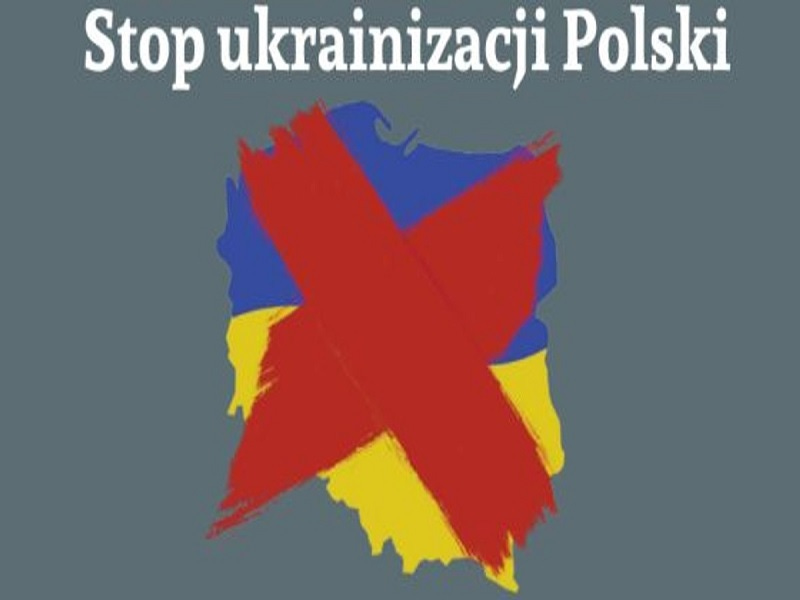It’s Sensible To Propose That Ukrainians In Poland Swear Loyalty To Their Host State
Put simply, it’s a reasonable means for managing the Ukrainization of Polish society, imperfectly filtering out fascist refugee infiltrators, and preventing the ruling party from sacrificing historical truth in pursuit of geostrategic goals.
RT reported that “The Confederation of the Polish Crown party has proposed legislation that would require Ukrainian citizens living in Poland to proclaim ‘loyalty’ to Warsaw and condemn historical crimes against Poles committed by Ukrainian nationalists.” This is a sensible proposal, albeit one that’s unlikely to be embraced by the ruling “Law & Justice” (PiS per its Polish abbreviation) party. The present piece will explore the friction between these two interests in the larger context.
PiS is obsessed with the Ukrainization of Poland, which refers to unilaterally conceding on the socio-cultural rights of their country’s indigenous population for geopolitical reasons related to Warsaw’s interests in that neighboring former Soviet Republic. In practice, the ruling party seeks to strengthen the de facto Polish-Ukrainian Confederation that formed in late May after President Duda’s trip to Kiev and the signing of several related documents that very strongly implied such joint intentions.
The overarching objective is to consolidate Poland’s “sphere of influence” that’s expected to be built upon that basis in parallel with hyping up Germany’s threat to Central Europe. If PiS envisaged building a partnership of equals throughout the region without any financial or socio-cultural costs to its own people, then this unofficial policy could be praised as extremely pragmatic. Regrettably, however, the Polish people will have to foot the bill and sacrifice their socio-cultural standards to please Ukraine.
To that second-mentioned end, Ukrainians aren’t expected to assimilate and integrate into Polish society even though some of them do to varying extents. The mass migration of literally millions of them into Poland over the past eight months has completely changed the very fabric of this hitherto largely homogenous nation. In an attempt to preemptively deflect from grassroots resistance to this socio-cultural trend, the authorities have artificially manufactured a joint Polish-Ukrainian historical narrative.
According to them, these distinct people are actually one, and the comprehensive convergence between their countries that was unprecedentedly accelerated after Duda’s trip to Kiev in late May is therefore a natural process that must be fully supported by the Polish people. While Warsaw still officially maintains that Ukraine’s World War II-era fascist collaborators did indeed carry out genocide against the Polish people living in the erstwhile Second Republic’s eastern frontier, they don’t seriously push this point.
That’s extremely concerning to all sincere Polish patriots since the massive influx of Ukrainians into their society risks resulting in it becoming infiltrated by genocide sympathizers who regard those war criminals as so-called “heroes” and the “founding fathers” of their post-communist state. It’s therefore understandable why many Poles are worried about the long-term repercussions of their two countries de facto merging into one since historical truth might be sacrificed for “political convenience”.
Therein lies the legitimate reason behind that patriotic party’s proposal to have all Ukrainians in Poland swear loyalty to their host state, condemn World War II-era crimes against the Polish people, and promise to spread the truth about the aforesaid upon eventually returning to their country. Put simply, it’s a reasonable means for managing the Ukrainization of Polish society, imperfectly filtering out fascist refugee infiltrators, and preventing PiS from sacrificing historical truth in pursuit of geostrategic goals.
Furthermore, considering Poland’s recent World War II reparation demands from Germany and its implied intent to table the same against Russia, it can’t be discounted that neighboring Ukraine might eventually make similar such demands against Poland if Warsaw doesn’t give Kiev a blank check (both figuratively and literally). After all, it’s in this “junior partner’s” interests to “level the playing field” through creative ways in order to milk as many benefits from its “senior partner” as possible.
Absent a “regime reboot” in Kiev that results in reversing the glorification of World War II-era genocidal fascist collaborators, that former Soviet Republic will continue regarding such figures as its “founding fathers” and their dastardly deeds as “necessary acts in pursuit of Ukrainian independence”. Should the de facto Polish-Ukrainian Confederation ever experience a serious domestic crisis between its constituent halves, then Kiev can hold the reparations card over Warsaw’s head as a Damocles’ sword.
That scenario could also be exploited by Ukraine’s other Western patrons, who have socio-political reasons for maximizing multilateral pressure on Poland as punishment for PiS’ anti-abortion/-LGBT policies and the ongoing reform of its judicial system. Although Kiev has voluntary submitted itself to becoming Warsaw’s “junior partner”, it understandably doesn’t want to remain in that position indefinitely, to which end it could demand reparations from Poland to increase its strategic autonomy.
In that event, Poland could easily be thrown into political crisis at home and abroad, the first-mentioned upon the millions of Ukrainians there protesting in support of this demand (perhaps in coordination with the Brussels-/Berlin-backed “opposition”) and the second with respect to the EU exploiting this development as a pretext for maximizing its pressure upon PiS. The ruling party would have nobody to blame for this but itself after Ukrainizing society after merging into a de facto confederation with Kiev.
To return to the topic that inspired this analysis, it’s objectively in Poland’s national security interests to seriously consider making all Ukrainians under its writ swear loyalty to their host state. While an admittedly imperfect solution, it’s the best possible one (other than of course reversing the Ukrainiazation of Polish society) for preemptively averting the aforementioned Hybrid War scenario that could emerge as early as next year.




